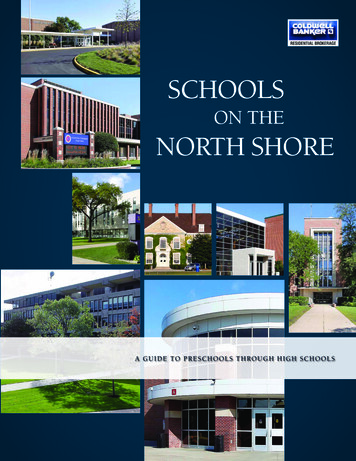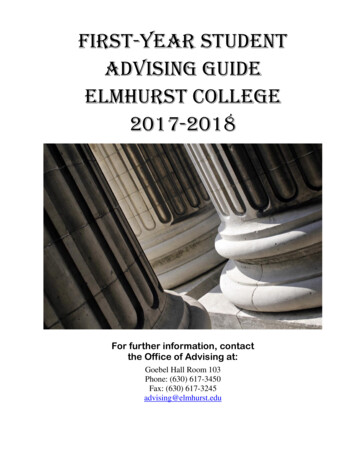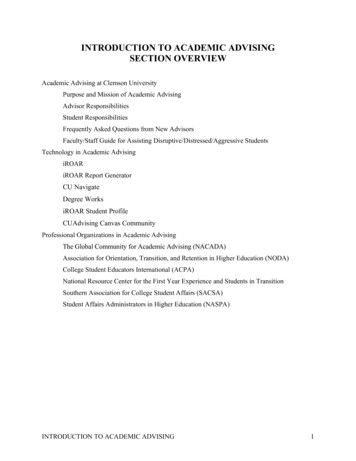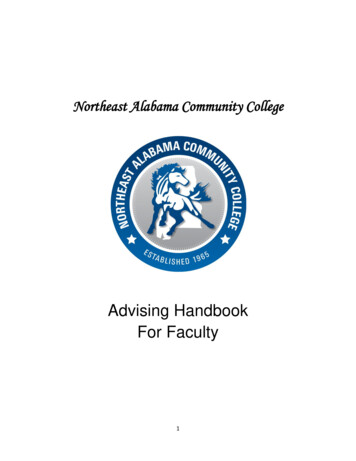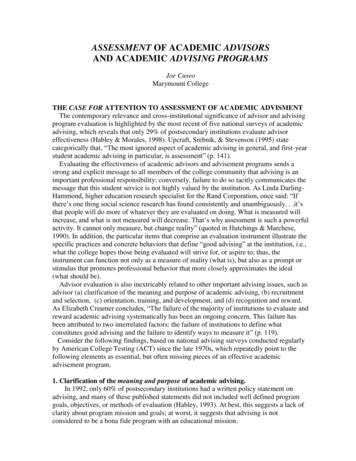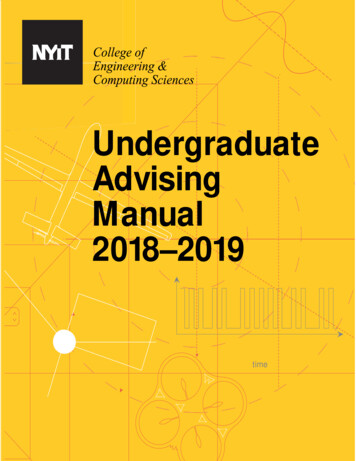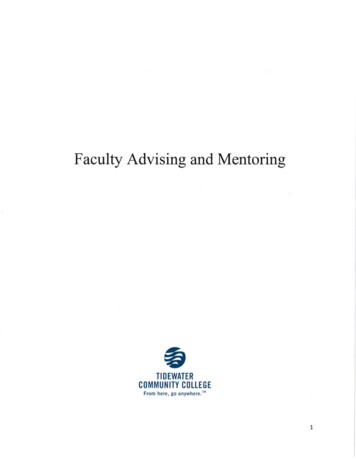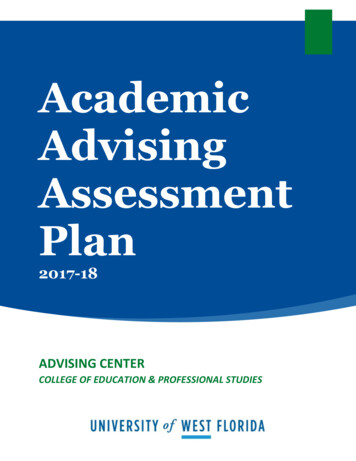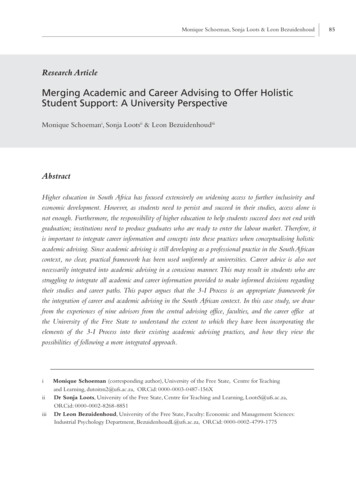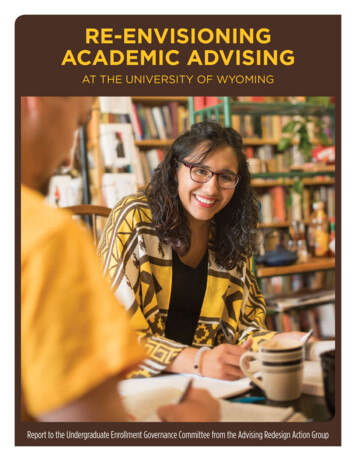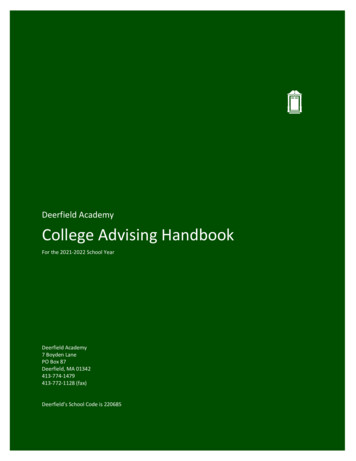
Transcription
Deerfield AcademyCollege Advising HandbookFor the 2021-2022 School YearDeerfield Academy7 Boyden LanePO Box 87Deerfield, MA 01342413-774-1479413-772-1128 (fax)Deerfield’s School Code is 220685
UPDATED AUGUST 2021 — PAGE ii
Table of ContentsCollege Advising at Deerfield Academy . 1College Advising Office & Staff . 2The College Search Process . 3Ask Yourself . 3Where to Begin to Gather Information . 3Naviance . 4Selectivity . 4Reputation . 4Independent Counselors . 4What Are Colleges Looking For? . 5The Academic Program and Record . 5Standardized Test Scores . 5Extracurricular Activities . 5Arts Supplements/Music Auditions . 5Recommendations . 6Personal Statement/College Essays . 6Legacy/Connections. 6College Advising Timeline for Students. 8Ninth Grade . 8Tenth Grade. 8Junior Year . 8Summer Before Senior Year . 10Research . 10Naviance . 10Visits and Interviews . 10Teacher Recommendations . 11ACT/SAT Preparation . 11Organization . 11Summer Communication . 11Common Application & College Essay . 12Senior Year . 12Early Decision/Action Plans . 13Gap Year Programs . 13College Visits . 14Scheduling a College Visit . 14Standardized Testing . 15Testing Accomodations . 15Testing Timeline . 16Test Optional/Flexible . 17Test Preparation . 17NCAA Guidelines . 18Repeating a Grade . 18What You Need to Do . 18Naviance Family Connection . 19UPDATED AUGUST 2021 — PAGE iii
Financial Aid and Scholarships . 20What You and Your Parents Need to Know . 20Important Terms to Know . 20UPDATED AUGUST 2021 — PAGE iv
College Advising at Deerfield AcademyOur mission is to advise and support our students as they consider their futures beyond Deerfield. In our studentcentered process we urge students to be self-aware as they explore their full range of options. We assist them inpreparing authentic applications that highlight their academic accomplishments and talents. All of our work isguided by Deerfield’s core values—respect, honesty, and concern for others.We encourage students to focus on finding the “right college match.” For our students that means identifying andapplying to colleges and universities where they will be intellectually challenged and socially engaged; schoolswhich will encourage and inspire them as learners, thinkers, and citizens.Applying to college is a process of discovery, of pondering who you are and who you want to become, and ofcontemplating what role you want to play in the larger world. The college search is, in essence, an extendedresearch project, which will require students to look within themselves for many of the answers. Students willlearn to identify and assess themselves, to set priorities, and to make major decisions. How a student navigatesthrough this process is just as important as where they end up. Along the way students will develop and honetheir organization, communication, and research skills.The Deerfield College Advising staff has an extensive breadth and depth and range of experience unmatched bymany schools. We are here to guide and support you as you navigate the college admissions process. We believethat each student has their own unique journey through this process, so almost all of our work with students isindividualized. Our commitment is to be responsive to both students and parents, as well as professional, realisticand well-informed.Specific college advising staff responsibilities include: Developing a balanced list of prospective colleges based on a student’s performance and statedpreferences Advocating for all Deerfield students in the college process Serving as a resource for parents and students throughout the process Estimating chances for admission based on student performance, knowledge of admission trends, pastexperience and Naviance data Writing an honest letter of recommendation for each student with an emphasis on strengths and growth Providing appropriate support to students as they write essays and prepare their applications Sending transcripts and recommendations to colleges in a timely fashion based on the list studentsprovide in Naviance Maintaining strong, authentic relationships with college admissions officersEmailA student’s Deerfield email address will be the main form of contact that we use throughout this process. We urgestudents to check it frequently and maintain its viability. Also, please contact us using our Deerfield emailaddress to provide updates like your thinking about college, college visits, essay topics and/or drafts as you beginwriting your essays.UPDATED AUGUST 2021 — PAGE 1
College Advising Office & StaffThe College Advising Office is located on the second floor of the Boyden Library.Office Phone:Office Fax:413-774-1479413-772-1128Office email: advising@deerfield.eduTesting Coordinator email: testingcoordinator@deerfield.eduAmanda DawickiCollege Advising Assistantand Testing Coordinatoradawicki@deerfield.edu413-774-1479Erin HutchinsonCollege e OnufrieffCollege Advisormonufrieff@deerfield.edu413-774-1415Jamie FrankCollege Advisorjfrank@deerfield.edu413-774-1493Patrick MoriartyCollege Advisorpmoriarty@deerfield.edu413-774-1685Mark SpencerDean of College Advisingmspencer@deerfield.edu413-774-1424Victoria ThompsonCollege Advisorvthompson@deerfield.edu413-774-1551UPDATED AUGUST 2021 — PAGE 2
The College Search ProcessAsk Yourself The more self-aware students are in this process the more effective it will be. If students can be specific aboutwhat they want in a college, it is easier to help them identify colleges that fit their criteria. Of course, weunderstand that many students, especially at this early stage, don’t yet have a clear understanding of what theyare looking for, and we are here to help in this process of discovery. Many students need guidance as they begin tothink about themselves as college candidates and try to establish criteria for schools they want to investigate. Hereare a few questions parents and students might begin by considering. They are, obviously, directed to the student. What are your academic interests? What are your strengths as a student? In the classroom? Outside of the classroom? Have you worked to your potential? What activities do you enjoy the most? Do your activities show any pattern of commitment, competence, or contribution? What do you consider your greatest contribution to your community? (school or local) What are the characteristics that you feel are crucial for you in a college? Which interests do you plan to pursue? How do you want to grow and change? What particular facilities are important to you? How much of an academic challenge are you looking for? Is a particular location important to you? To your parents? Do you need academic structure? Does the composition of the student body matter to you? Describe. Will financial aid be a factor?Where to Begin to Gather InformationWe recommend the Fiske Guide to Colleges, which gives excellent thumbnail sketches of colleges, and thePrinceton Review’s Best 385 Colleges. The College Advising Office offers a collection of college resource materials.Of course, the Internet is brimming with information. A few sites we have found useful for students arecollegeboard.org and unigo.com. Lastly, individual college websites provide students with the latest informationabout their campuses and their admission criteria.RECOMMENDED COLLEGE GUIDEBOOKS The College Handbook, The College Board The Fiske Guide to Colleges, Edward B. Fiske The Best 385 Colleges, Princeton Review Colleges that Change Lives, Loren Pope Looking Beyond the Ivy League, Loren PopeUPDATED AUGUST 2021 — PAGE 3
Barron’s Profiles of American Colleges, Barron’s Peterson’s Guide to Four Year Colleges, Peterson’s GuidesNavianceDeerfield subscribes to Naviance, an Internet database that we find to be helpful in the college search process.Deerfield juniors will be given a password/log-on to access the Deerfield Naviance data in the fall. Naviance helpsstudents keep track of their prospective colleges and active applications and provides information about thelikelihood of their admission to each college, based on the results of previous Deerfield students. Naviance canshow students exactly where they fall on a graph of test scores (x axis) and GPA (y axis) of other DA students whoapplied in prior years to each college. It is important to note, however, when looking at these graphs that“hooked” students (recruited athletes, legacies, underrepresented minorities, first generation college students,and development cases) are not flagged as such and will skew the averages somewhat. The Naviance graphs showgeneral trends and help students, advisors, and parents to develop a balanced list of “reach,” “possible,” and“more likely” schools. Naviance is also used to keep track of students’ college lists and is the mechanism throughwhich we send the majority of school forms to colleges. Thus, it is imperative that you communicate with yourcollege advisor to maintain and update your college list in Naviance throughout the process.SelectivityThere seems to be no end in sight to the ever-increasing number of applications to colleges, and with that comesthe continuing fall of admit rates. The most recent admission cycles have seen more admit rates below 10% thanever before. Back in 1987, Harvard had the lowest admit rate that year at 16%; today, that is Berkeley andColgate’s admit rate. However, it is important to realize that the number of applications a school receives, orhow low their admit rate is, does not determine that school’s quality nor its fit for each student. Yet, so often inthis process families buckle to the data and allow the ranking or admit rate to determine what schools are“suitable”—thereby neglecting the well-being of the student and the wholistic nature of finding a “best fit” college.The bottom line is that most of our students go on to independent colleges and universities that are “ranked” inthe top 100. In fact, the biggest hurdle that many of them face may be their desire to apply to the same short listof colleges in which most of their classmates at Deerfield, and students at other New England boarding and dayschools, are also interested. As such, it is imperative that students look beyond the familiar, standard list in orderto consider the full range of colleges available to them.ReputationA word of caution—please make your own decisions regarding the relative merits of colleges based on currentinformation. It is easy to be influenced by stereotypes and past reputations, but times change and so doinstitutions! Does this college have the program you are seeking? Is there a good match between your ability andthe intellectual life of the college? Work to gather as much information as you can from multiple sources to get thetruest sense of an institution. Remember that different colleges appeal to different individuals for a variety ofreasons, and try to base your opinions on first-hand knowledge of a particular institution’s unique characteristicscoupled with a realistic understanding of the student’s needs and talents. U.S. News & World Report and othersimilar ranking systems give only the most superficial glimpse of a college; they are certainly not ranking with yourindividual needs and talents in mind.Independent CounselorsOne of the many benefits of attending Deerfield Academy is the individual attention provided each student; thisincludes the college advising process. We understand that some families choose to work with independent, forhire advisors, however, we assure you there is no need to do so. If you are considering hiring an outside agent,essay consultant, or application manager, please discuss this with your child’s advisor. It is important we have a fullunderstanding of the advice you receive from outside sources as we work to support you. Remember, yourDeerfield advisor is the only one who can represent the student to colleges.UPDATED AUGUST 2021 — PAGE 4
What Are Colleges Looking For?When reviewing students’ applications admissions committees consider several factors: academic program andgrades, standardized test scores, extracurricular and community-based activities, recommendations, essays and, insome cases, interviews or demonstrated interest.The Academic Program and RecordFor the majority of our students, academic performance—the courses a student has taken and how well they havedone in mastering their content—is central to his or her success as an applicant. While colleges like to see depth inevery area of the curriculum, they understand that scheduling and extracurricular commitments do not alwaysallow for this. Although each college has different guidelines on course selection in high school, the most selectivecolleges are typically looking for: 4 years of English 4 years of math (including calculus for students interested in Engineering or Business) 3-4 years of history/social science/philosophy & religion 3-4 years of lab science, including physics, chemistry, and biology 3-4 years of one foreign language and usually some study of visual or performing arts (1 year graded required by the University ofCalifornia system)In June after the junior year we will send a copy of the transcript(s) we have on file. While college admissionsofficers appreciate an improving record, performance all the way through high school will figure in their decisions.Many colleges ask students to indicate a possible major or to apply for specific programs. Obviously, an applicant’sacademic profile should match the program or major to which they apply. Students should consult with theircollege advisor in selecting senior year courses.Standardized Test ScoresWhile an increasing number of schools have made standardized tests optional (and a few have even become “testblind”), for most colleges, having a strong SAT or ACT score can help you in the admissions process. Super-scoring(combining the highest scores from different test sittings) does happen at most institutions for the SAT, but lessoften for the ACT. Essentially, it is important to understand colleges’ testing requirements, and it is recommendedthat students plan for and take standardized tests as part of their college application process. Check collegewebsites to find up-to-date information on testing policies and median test score ranges for accepted students.Extracurricular ActivitiesBecause admissions officers are looking for students who will add to the community as well as to the classroom,how students spend their time outside the classroom matters. Special talents, such as musical or athletic skills,community leadership, work with publications, or dramatic or artistic abilities, are all still weighed in the decisions.We find that admission committees favor a student who demonstrates authentic passion and meaningfulcontributions. While many college freshmen are well-rounded, admissions offices are wary of the student whodoes things just to build a long list of extra-curriculars for college applications.Arts Supplements/Music AuditionsYou should begin to prepare your arts supplement/music audition piece over the summer before your senior year,whether you plan to submit a theater clip, a music clip, or slides of your artwork or photography. Art and musicinstructors at Deerfield are available to help students put together portfolios or audition tapes in the fall of theirsenior year. If you are applying to a music degree program, please know that an increasing number of musicUPDATED AUGUST 2021 — PAGE 5
schools are requiring prospective undergraduates to send a pre-screen audition (CD, DVD, web-based platform)before considering them for live auditions. Check carefully for due dates, which sometimes differ from applicationdeadlines, and instructions about the desired/required format for your submission.RecommendationsFor most colleges, required recommendations will come from the college advisor and two teachers (of thestudent’s choosing). We usually recommend that those teachers come from two different academic areas. Duringthe spring term of the junior year, students and their college advisor will discuss who to select for their teacherrecommendations. Overall, recommendations help the college get a deeper understanding of the applicant as astudent.Personal Statement/College EssaysColleges almost always require (yes, some do not) applicants to submit an essay. The essay is an opportunity forthe student to showcase themselves. Being authentic is critical. As UPenn says on their website: “We carefully readeach essay you submit, as they can help us get to know you much better than your transcripts and test scores.While essays are a good indication of how well you write, they are also windows into how you think, what youvalue, and how you see the world. Your numbers tell us what kind of student you are. Your essays tell us what sortof person you are—and provide a glimpse into the intangibles you might bring to our community.”The 2021-2022 common application essay prompts (students choose one to answer and they are capped at 650words) are: Some students have a background, identity, interest, or talent that is so meaningful they believe theirapplication would be incomplete without it. If this sounds like you, then please share your story. The lessons we take from obstacles we encounter can be fundamental to later success. Recount a timewhen you faced a challenge, setback, or failure. How did it affect you, and what did you learn from theexperience? Reflect on a time when you questioned or challenged a belief or idea. What prompted your thinking?What was the outcome? Reflect on something that someone has done for you that has made you happy or thankful in a surprisingway. How has this gratitude affected or motivated you? Discuss an accomplishment, event, or realization that sparked a period of personal growth and a newunderstanding of yourself or others. Describe a topic, idea, or concept you find so engaging that it makes you lose all track of time. Why does itcaptivate you? What or who do you turn to when you want to learn more? Share an essay on any topic of your choice. It can be one you've already written, one that responds to adifferent prompt, or one of your own design.In addition to the common application essay, many colleges ask very specific supplemental essay questions—someare short answers and others can prompt additional 500-word essays. You can find schools’ supplemental essayquestions through the Common Application, as well as the schools’ individual websites.Legacy/ConnectionsThe whole question of alumni legacies or influential friends is difficult to gauge, but our general recommendationto students is not to be too proud to take advantage of “connections.” The alumni legacy does count forsomething; it may tip a candidate into the college when all else seems equal, but it also may only prompt anespecially regretful letter of denial. Parents and students are cautioned, however, not to “manufactureconnections,” asking for letters of reference from individuals who do not know the candidate well. Many studentswho are admitted to college have no “connections,” and using “connections” that one really doesn’t have can be aUPDATED AUGUST 2021 — PAGE 6
decidedly negative influence on the admission decision. We must also caution you not to rely too heavily onconnections; they are obviously no substitute for a strong record and careful evaluation of the right matchbetween student and college.UPDATED AUGUST 2021 — PAGE 7
College Advising Timeline for StudentsNinth GradeNinth grade is more about acclimating to Deerfield and establishing a strong foundation for academic andextracurricular success than it is about applying to college. Our advice to students is to use this time wisely, and tomake the most of the opportunities available here at Deerfield. Get involved in activities which interest you. Seekout courses that will appropriately stimulate and challenge you—course selection and how you perform in thosecourses is key to establishing a strong academic profile. Consequently, spend time speaking to your faculty advisorand your parents regarding what you plan on studying. Also, for potential Division I or II athletes, be sure to checkwith the college advising office if you have questions about NCAA compliance, particularly if you repeated a grade.Overall, you don’t need to think too much about the details of the college admission process. Instead work hard,get involved, discover your passions, and have some fun!Tenth GradeTenth-grade students should begin to prepare themselves for the admissions process, not by selecting specificcolleges to apply to, but by thorough self-exploration. At this early stage it is helpful to know what one’s personalpreferences are, as well as what the college search process ahead will look like. To this end, the college advisorswill hold an introductory college session for tenth-graders in January or February after which they will be availablefor a few weeks for ad-hoc one-on-one counseling to answer any individual questions. During those meetings,tenth-graders can check in with a college advisor on items such as, course selection, review of NCAA compliance ifthey hope to be a recruited athlete, standardized testing, and summer programs. Tenth-graders are also welcometo attend the spring college fair. Although visits to colleges typically begin in earnest with spring break of one’sjunior year, some students and their parents may want to begin touring campuses in the summer between theirtenth-grade and junior years to get a general feel for what colleges will be a “good fit” based on location, size,academic focus, and selectivity. A comprehensive list of colleges for a student will be created in the winter of theirjunior year.Junior YearWe begin our work with juniors with our fall term college advising seminar, and then start individual meetingsafter seniors have submitted their early applications. Students will be assigned to specific college advisors in midNovember; assignments will be emailed and available on DAinfo. Each college advisor will work with a crosssection of the class.FALL TERM COLLEGE ADVISING SEMINARThis is a required seminar for juniors about gearing up for the college admissions/application process, and willmeet in late September or early October. Juniors will be divided into small groups and are scheduled for theseminar during one of their free periods. The seminar will: Explore the various factors that can influence college choice, such as location, size, proximity to a city,relative degrees of competitiveness and selectivity, and the availability of special programs or facilities. Introduce students to Naviance and students will be given a password for this internet database. Touch on testing, interviews, recommendations, visiting schools, how admission officers make theirdecisions, and any other concerns that the students in each group may have.In this seminar the college advisors will stress the tremendous variety of colleges and the fact that the search mustbe an individual one. By explaining the process in great detail during the junior year, we hope to make eachstudent feel comfortable with this new responsibility and encourage rational, intelligent decisions during thesenior year. We are starting this discussion early in the junior year so that the student has time to digest asigni
College Advising Office & Staff The College Advising Office is located on the second floor of the Boyden Library. Office Phone: 413-774-1479 Office Fax: 413-772-1128 Office email: advising@deerfield.edu Testing Coordinator email: testingcoordinator@deerfield.edu Amanda Dawicki College Advising Assistant and Testing Coordinator
